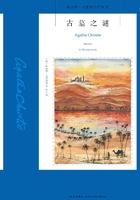We have our own little tricks, we savages!--Cydalise," said he, looking at the country girl, "is the animal I need.--How much does she owe?"
"A hundred thousand francs," said Cydalise.
"She says little--but to the purpose," said Carabine, in a low tone to Madame Nourrisson.
"I am going mad!" cried the Brazilian, in a husky voice, dropping on to a sofa. "I shall die of this! But I must see, for it is impossible!
--A lithographed note! What is to assure me that it is not a forgery?
--Baron Hulot was in love with Valerie?" said he, recalling Josepha's harangue. "Nay; the proof that he did not love is that she is still alive--I will not leave her living for anybody else, if she is not wholly mine."
Montes was terrible to behold. He bellowed, he stormed; he broke everything he touched; rosewood was as brittle as glass.
"How he destroys things!" said Carabine, looking at the old woman. "My good boy," said she, giving the Brazilian a little slap, "Roland the Furious is very fine in a poem; but in a drawing-room he is prosaic and expensive."
"My son," said old Nourrisson, rising to stand in front of the crestfallen Baron, "I am of your way of thinking. When you love in that way, and are joined 'till death does you part,' life must answer for love. The one who first goes, carries everything away; it is a general wreck. You command my esteem, my admiration, my consent, especially for your inoculation, which will make me a Friend of the Negro.--But you love her! You will hark back?"
"I?--If she is so infamous, I--"
"Well, come now, you are talking too much, it strikes me. A man who means to be avenged, and who says he has the ways and means of a savage, doesn't do that.--If you want to see your 'object' in her paradise, you must take Cydalise and walk straight in with her on your arm, as if the servant had made a mistake. But no scandal! If you mean to be revenged, you must eat the leek, seem to be in despair, and allow her to bully you.--Do you see?" said Madame Nourrisson, finding the Brazilian quite amazed by so subtle a scheme.
"All right, old ostrich," he replied. "Come along: I understand."
"Good-bye, little one!" said the old woman to Carabine.
She signed to Cydalise to go on with Montes, and remained a minute with Carabine.
"Now, child, I have but one fear, and that is that he will strangle her! I should be in a very tight place; we must do everything gently.
I believe you have won your picture by Raphael; but they tell me it is only a Mignard. Never mind, it is much prettier; all the Raphaels are gone black, I am told, whereas this one is as bright as a Girodet."
"All I want is to crow over Josepha; and it is all the same to me whether I have a Mignard or a Raphael!--That thief had on such pearls this evening!--you would sell your soul for them."
Cydalise, Montes, and Madame Nourrisson got into a hackney coach that was waiting at the door. Madame Nourrisson whispered to the driver the address of a house in the same block as the Italian Opera House, which they could have reached in five or six minutes from the Rue Saint-Georges; but Madame Nourrisson desired the man to drive along the Rue le Peletier, and to go very slowly, so as to be able to examine the carriages in waiting.
"Brazilian," said the old woman, "look out for your angel's carriage and servants."
The Baron pointed out Valerie's carriage as they passed it.
"She has told them to come for her at ten o'clock, and she is gone in a cab to the house where she visits Count Steinbock. She has dined there, and will come to the Opera in half an hour.--It is well contrived!" said Madame Nourrisson. "Thus you see how she has kept you so long in the dark."
The Brazilian made no reply. He had become the tiger, and had recovered the imperturbable cool ferocity that had been so striking at dinner. He was as calm as a bankrupt the day after he has stopped payment.
At the door of the house stood a hackney coach with two horses, of the kind known as a /Compagnie Generale/, from the Company that runs them.
"Stay here in the box," said the old woman to Montes. "This is not an open house like a tavern. I will send for you."
The paradise of Madame Marneffe and Wenceslas was not at all like that of Crevel--who, finding it useless now, had just sold his to the Comte Maxime de Trailles. This paradise, the paradise of all comers, consisted of a room on the fourth floor opening to the landing, in a house close to the Italian Opera. On each floor of this house there was a room which had originally served as the kitchen to the apartments on that floor. But the house having become a sort of inn, let out for clandestine love affairs at an exorbitant price, the owner, the real Madame Nourrisson, an old-clothes buyer in the Rue Nueve Saint-Marc, had wisely appreciated the great value of these kitchens, and had turned them into a sort of dining-rooms. Each of these rooms, built between thick party-walls and with windows to the street, was entirely shut in by very thick double doors on the landing. Thus the most important secrets could be discussed over a dinner, with no risk of being overheard. For greater security, the windows had shutters inside and out. These rooms, in consequence of this peculiarity, were let for twelve hundred francs a month. The whole house, full of such paradises and mysteries was rented by Madame Nourrisson the First for twenty-eight thousand francs of clear profit, after paying her housekeeper, Madame Nourrisson the Second, for she did not manage it herself.
The paradise let to Count Steinbock had been hung with chintz; the cold, hard floor, of common tiles reddened with encaustic, was not felt through a soft thick carpet. The furniture consisted of two pretty chairs and a bed in an alcove, just now half hidden by a table loaded with the remains of an elegant dinner, while two bottles with long necks and an empty champagne-bottle in ice strewed the field of bacchus cultivated by Venus.















